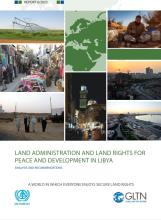Land Library
Bem-vindo à Biblioteca do Land Portal. Explore nossa vasta coleção de recursos de acesso aberto (mais de 74.000), incluindo relatórios, artigos de revistas científicas, trabalhos de pesquisa, publicações revisadas por pares, documentos jurídicos, vídeos e muito mais.
/ library resources
Showing items 1 through 9 of 893.This report is a contribution towards the improvement of land management and land administration in Libya.
To ensure a better and more sustainable future for all, the 2030 Agenda for Sustainable Development (“the 2030 Agenda”) has identified 17 Sustainable Development Goals (SDGs) to be achieved by 2030.
The Global Land Indicators Initiative (GLII) platform was established in 2012 through the joint effort of United Nations Human Settlements Programme (UN-Habitat), the World Bank and Millennium Challenge Corporation with the aim of making global-scale monitoring of land governance a reality by 202
A lot of aspects are commonly subsumed under the concept land reform. These range from redistribution to tenure and agrarian reform. What do these different concepts mean? Agrarian reform: this is the broadest term and refers to attempts to change the agrarian structure of a country.
There has been rapid growth in urban populations in Namibia (Pendleton et al, 2014). This growth is amongst predominantly amongst less educated, poorer migrants from rural areas in search of opportunities in urban areas.
Ancestral land refers to ‘land of ancestors’. That is the land occupied by ones’ forebearers for generations and left something behind of value for current and future generations. There are usually contestations as to which ancestors the land
Namibia is moving towards an urbanised country. This is illustrated by the fact that at independence Namibia was only 28% urbanized by 2011 urbanization has already grown to 42% and current projections are that by 2020 urbanization would by 66% and more than 70% by 2030.
Communal land is one of the land tenure systems in Namibia, the other being freehold land tenure system.
Namibia is compelled to observe and to undertake efforts to realise the right to adequate housing, since it has ratified the International Covenant on Economic, Social and Cultural Rights in 1994.



